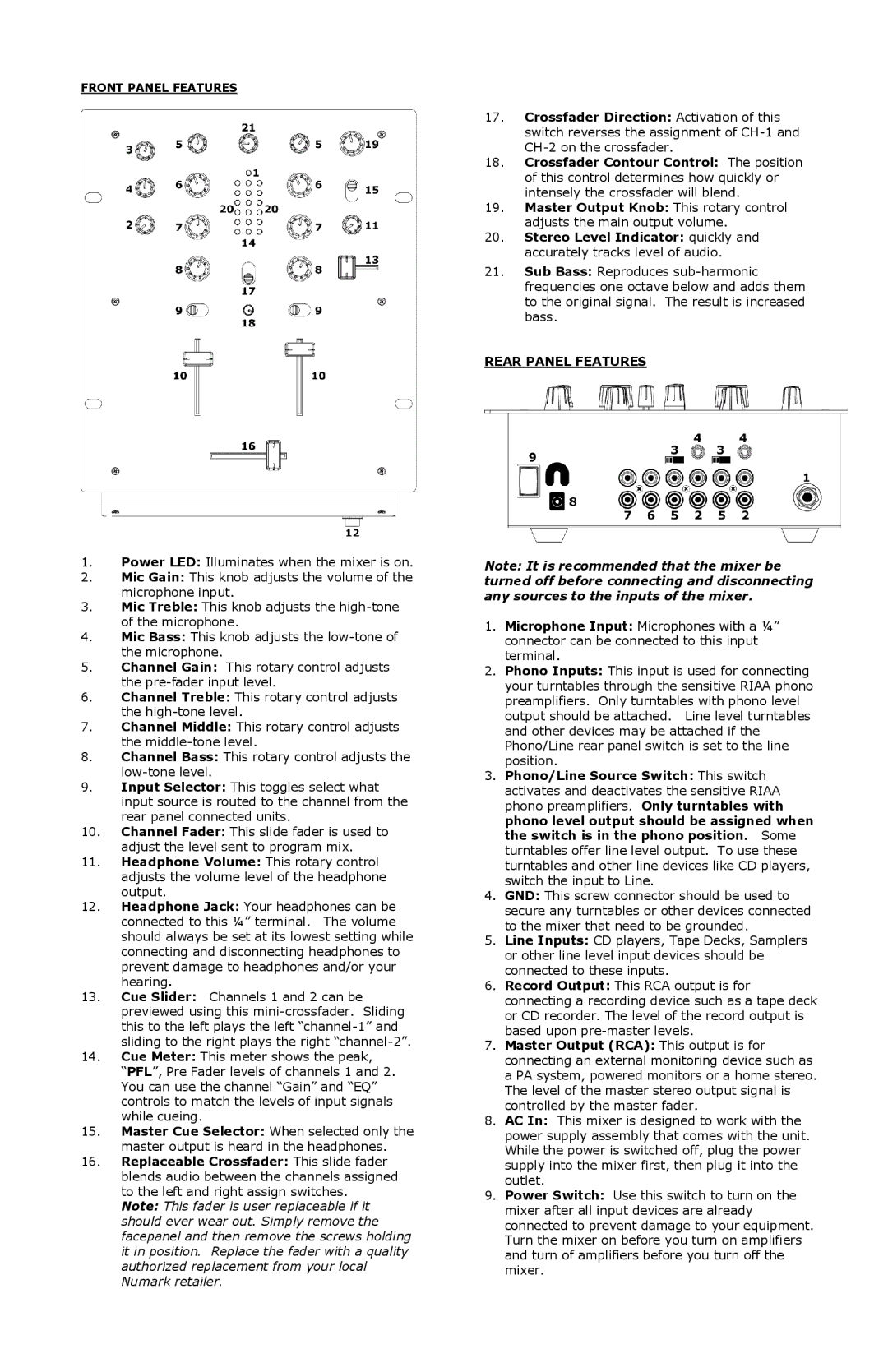
FRONT PANEL FEATURES
17. Crossfader Direction: Activation of this switch reverses the assignment of
18. Crossfader Contour Control: The position of this control determines how quickly or intensely the crossfader will blend.
19. Master Output Knob: This rotary control adjusts the main output volume.
20. Stereo Level Indicator: quickly and accurately tracks level of audio.
21. Sub Bass: Reproduces
REAR PANEL FEATURES
1.Power LED: Illuminates when the mixer is on.
2.Mic Gain: This knob adjusts the volume of the microphone input.
3.Mic Treble: This knob adjusts the
4.Mic Bass: This knob adjusts the
5.Channel Gain: This rotary control adjusts the
6.Channel Treble: This rotary control adjusts the
7.Channel Middle: This rotary control adjusts the
8.Channel Bass: This rotary control adjusts the
9.Input Selector: This toggles select what input source is routed to the channel from the rear panel connected units.
10.Channel Fader: This slide fader is used to adjust the level sent to program mix.
11.Headphone Volume: This rotary control adjusts the volume level of the headphone output.
12.Headphone Jack: Your headphones can be connected to this ¼” terminal. The volume should always be set at its lowest setting while connecting and disconnecting headphones to prevent damage to headphones and/or your hearing.
13.Cue Slider: Channels 1 and 2 can be previewed using this
14.Cue Meter: This meter shows the peak,
“PFL”, Pre Fader levels of channels 1 and 2. You can use the channel “Gain” and “EQ” controls to match the levels of input signals while cueing.
15.Master Cue Selector: When selected only the master output is heard in the headphones.
16.Replaceable Crossfader: This slide fader blends audio between the channels assigned to the left and right assign switches.
Note: This fader is user replaceable if it should ever wear out. Simply remove the facepanel and then remove the screws holding it in position. Replace the fader with a quality authorized replacement from your local Numark retailer.
Note: It is recommended that the mixer be turned off before connecting and disconnecting any sources to the inputs of the mixer.
1.Microphone Input: Microphones with a ¼” connector can be connected to this input terminal.
2.Phono Inputs: This input is used for connecting your turntables through the sensitive RIAA phono preamplifiers. Only turntables with phono level output should be attached. Line level turntables and other devices may be attached if the Phono/Line rear panel switch is set to the line position.
3.Phono/Line Source Switch: This switch activates and deactivates the sensitive RIAA phono preamplifiers. Only turntables with phono level output should be assigned when the switch is in the phono position. Some turntables offer line level output. To use these turntables and other line devices like CD players, switch the input to Line.
4.GND: This screw connector should be used to secure any turntables or other devices connected to the mixer that need to be grounded.
5.Line Inputs: CD players, Tape Decks, Samplers or other line level input devices should be connected to these inputs.
6.Record Output: This RCA output is for connecting a recording device such as a tape deck or CD recorder. The level of the record output is based upon
7.Master Output (RCA): This output is for connecting an external monitoring device such as a PA system, powered monitors or a home stereo. The level of the master stereo output signal is controlled by the master fader.
8.AC In: This mixer is designed to work with the power supply assembly that comes with the unit. While the power is switched off, plug the power supply into the mixer first, then plug it into the outlet.
9.Power Switch: Use this switch to turn on the mixer after all input devices are already connected to prevent damage to your equipment. Turn the mixer on before you turn on amplifiers and turn of amplifiers before you turn off the mixer.
